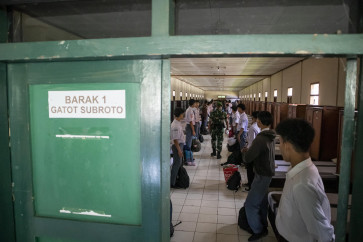Outsourcing to remain big labor issue next year
Outsourcing issue will remain a major stumbling block for the establishment of healthy industrial relations between employers and employees in Indonesia next year, worker rights leaders say
Change text size
Gift Premium Articles
to Anyone

O
utsourcing issue will remain a major stumbling block for the establishment of healthy industrial relations between employers and employees in Indonesia next year, worker rights leaders say.
Indonesian Prosperous Labor Union (KSBSI) chairman Rekson Silaban said outsourcing and the contract system had sharply reduced the number of permanent workers in the country from 67 percent of the total formal labor workforce in 2005 to only 35 percent this year, citing reports from the World Bank and the International Labor Organization.
“There are around 33 million formal workers across the nation, but only 11.5 million of them are permanently employed,” he said at a media briefing at the Indonesian Business Owners Association (Apindo) training center in Jakarta on Tuesday.
He said outsourced and contract workers lived in very uncertain conditions as they did not have guarantees for their future when their contracts ended. The workers also did not receive social security insurance and pension schemes, Rekson added.
“The root of the current problems is the toothless 2003 Labor Law. The law doesn’t stipulate any punishment for companies violating regulations on outsourcing,” he said.
Rekson said outsourcing would continue to hamper industrial relations if no legal solutions were made to address the problem.
Article 66 of the labor law stipulates that companies can only outsource work not related to their core operations or production activities, but there is no clause in the law explaining the punishment for companies violating the law.
“The law needs to be revised. Caps on outsourcing have to be clarified and sanctions for violators have to be strengthened,” Rekson said.
He expressed optimism that in 2011 the government, business owners and workers could work to improve mutual understanding and prevent miscommunication that often ended in counter-productive actions such as layoffs or strikes.
Apindo chairman Sofjan Wanandi said that the national tripartite agency (representing the government, business owners and workers) had requested the Indonesian Institute of Sciences (LIPI) to prepare a draft revision of the law. He called on stakeholders to refrain from unnecessary measures that could hamper the progress of the revision.
Recently, a fake revision of the law was circulated to the public containing controversial changes, including the removal of clauses stipulating that laborers had the right to severance pay if they were laid off. The fake draft incited massive protests from worker organizations, forcing the House of Representatives to remove the law from their list of priorities for 2011.
“The fake draft was clearly meant to impede the revision of the law and create friction among the government, businesses and workers,” Sofjan said.
He said a revision to the law had to be supported because the current unclear outsourcing regulations hurt both business owners and workers.
“All legal uncertainties related to labor have to be settled next year to attract more investment in labor-intensive industries. Currently, due to the uncertainties, investors have negative opinions about the business climate in our country,” he emphasized.









